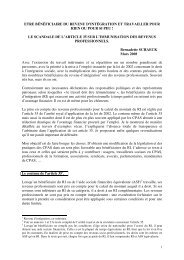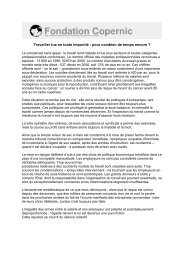Awra Amba RJ 300612 EN - Contacter un comité local d'Attac
Awra Amba RJ 300612 EN - Contacter un comité local d'Attac
Awra Amba RJ 300612 EN - Contacter un comité local d'Attac
Create successful ePaper yourself
Turn your PDF publications into a flip-book with our unique Google optimized e-Paper software.
<strong>Awra</strong> <strong>Amba</strong>, a current experiment of utopian socialism<br />
diversified into weaving, milling and trade. The cooperative owned in 2010 a weaving workshop, a<br />
mill, shops and an Isuzu truck (Jo10b/7).<br />
A first mill was donated in 2002 by the regional government through the Amhara Development<br />
Association, and since then the cooperative has continued to develop this activity. In 2010 it owned<br />
six electric mills for tef, maize and sorghum from the village and from neighbouring farmers<br />
(Jo10b/7): see Picture 8. Three new mills were added at the beginning 2012, one for tef, the second<br />
for maize and the last for husking rice (Crespo, 2012). "Neighbouring farmers prefer to use our mills<br />
because they trust us not to cheat them", according to one of the villagers (Halpern, 2007): it allows<br />
the clients to drop their grain off in morning and to get the flour back in evening, rather than to wait<br />
on the spot the flour to be ready as it is the case somewhere else; a second reason is the price, lower<br />
than in the neighbouring mills: 0.20 birr per kilo of flour, instead of 0.25 to 0.30 (Crespo, 2012).<br />
The comm<strong>un</strong>ity owned also a breezeblock spinning and weaving workshop with corrugated iron roof<br />
(Picture 4 on page 29). The building was paid for in 2007 by the Netherlands and the Ethiopian<br />
government (ESRDF) (Ya08/120), as well as five steel looms (Picture 8). The cooperative acquired<br />
also eight steel looms and six wood looms. All these looms are operated by hand. The cooperative<br />
would like to have electric machines, which are less tiring (Jo10b/7). Spinning is considered an easy<br />
job, and is done in the same building. The village produces shirts, dresses, skirts, tablecloths, scarves,<br />
hats, towels, blankets and other garments (Mamo, 2006), sold on site, in their shops of Woreta and<br />
Alem Ber, and on markets. The main customers of the cooperative products are the merchants,<br />
visitors, farmers and weavers from the neighbouring kebeles (Ya08/109).<br />
Picture 8:<br />
Cooperative: mill (notice the cross on the breast of the yo<strong>un</strong>g man <strong>un</strong>der the mill,<br />
which points at him as neighbour), and steel loom (pict. C. Crespo).<br />
The cooperative owns also several shops – the main grocery shop of the village, two small shops in<br />
the village, and two shops in the neighbouring cities of Woreta and Alem Ber (Jo10b/7), and the<br />
coffee shop of the village. The grocery shops of the village serve the residents of <strong>Awra</strong> <strong>Amba</strong> and<br />
neighbouring villages (Picture 9). The coffee shop is the heart of the village where people meet,<br />
gossip and debate about every day things as well as big philosophical matters (Tervo, 2009). It does<br />
not serve coffee neither alcohol, which are considered addictive and a threat to mental well-being,<br />
but a lot of tea and soft drinks. The prices are 1 birr for a drink and 4 birrs for a dish.<br />
The Isuzu truck, recently purchased, is used for the supply of raw cotton in Addis Ababa, for the<br />
transport of finished products, and for the neighbouring villages against payment (Crespo, 2011).<br />
Finally, the cooperative has a guest house equipped with toilets (a simple but clean room costs<br />
46 / 85

















